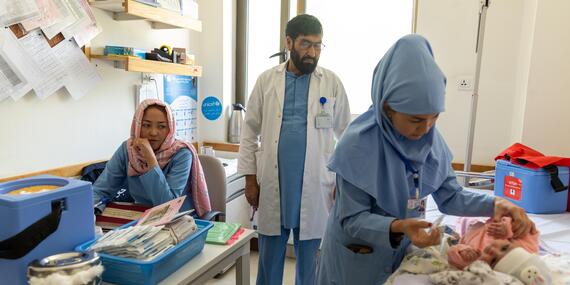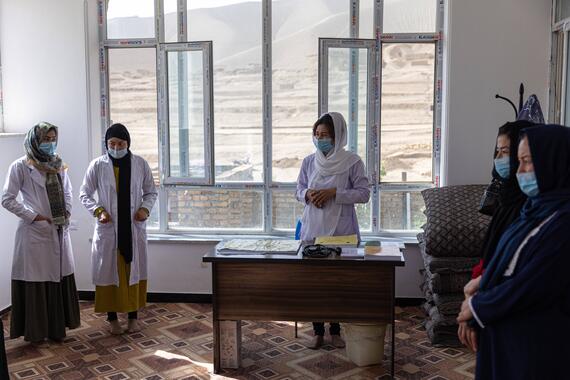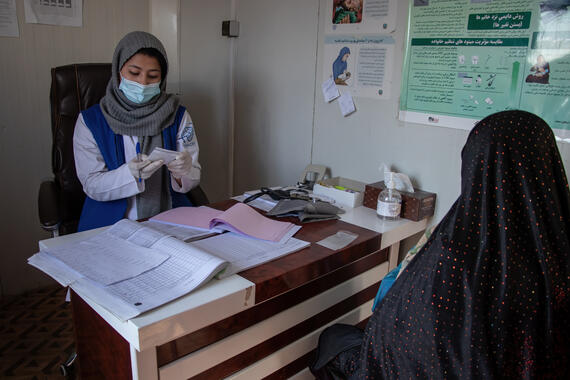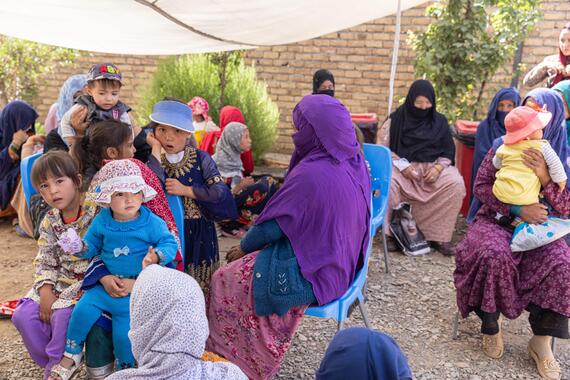Afghanistan: Women's healing touch saves lives

Afghanistan has one of the world’s highest rates of maternal, infant and child mortality, with 699 deaths per 100,000 births. A combination of four decades of conflict, a lack of structural investment in the health system, and less donor support for longer-term development assistance since August 2021 has affected the accessibility and quality of maternity and paediatric health-care services. Gains made over the last 20 years are now being reversed.
Dr. Sahar* was recently promoted from health-care officer to regional health-care manager of a United Nations (UN) organization in Afghanistan. She told us about her experiences and her concerns for women and girls in Afghanistan.
“I oversee approximately 700 medical facilities spread over nine provinces in the northern region of Afghanistan. Health care is everyone's lifeline, and even though this is a huge challenge I love doing it. The country’s public health-care system nearly crumbled after the Government was overthrown in August 2021, but the UN and its partners helped to sustain the health-care services that are still in place today.
“If Afghanistan wants to enhance access to public health care for women and children, it needs more women health professionals. Many skilled female health-care professionals left the country after the fall of the Government, and this caused a significant gap in the health-care sector.”

Advocate for better health care
“It was wonderful to move from being a specialized clinician to overseeing such a huge public health-care portfolio, but it also made me more aware of the health-care requirements of wider communities. The scope of my work was limited when I worked as a clinician, but with my new position I can help more people.
“For instance, as a paediatrician I was so excited to assist expectant mothers in giving birth. I had no idea that the mothers and their newborns required extra support from their families and the community following delivery. They need access to clean water, sanitation, hygiene and nutrition. Some need counselling.
“I now have a greater awareness of the broader issues affecting communities. And I can influence decisions and advocate for better access to comprehensive public health-care services for everyone, especially women and children.
“In my 14 years of medical practice, I have helped deliver more than 10,000 newborns. Many of these children now require humanitarian assistance to get by.”

Women helping women
“When we say that women must help women in the public health-care sector, we are not trying to discriminate against men. Women health professionals have a unique grasp of the needs of female patients. More needs to be done to help women than just supplying them with medicine, such as psychological support.
“When I worked in clinics and hospitals, I learned that most women prefer to have their babies delivered by or to be treated by another woman. This is because the moment of delivery is extremely sensitive and emotional. They need to feel that their dignity is respected and protected, and that they are given the appropriate attention and advice.
“This is not exclusive to the field of maternal health. Many women prefer to be seen by women health-care professionals, even in other fields, like dental care. They feel more at ease expressing themselves and speaking to another woman, beyond medical advice.
“One way to improve women's access to health-care services in a Muslim country like Afghanistan, where women are not allowed to mix with men, is to train and deploy more women health-care workers.
"The findings of a recent Ground Truth Solutions report show that women-led health-care projects performed better because they had more opportunities for women-to-women interactions. This does not happen with men-led health-care projects."
The Ground Truth Solutions report provides timely insights into the perceptions of women accessing aid without the availability of female aid workers. The report’s findings show that understanding gender-related access barriers and community recommendations can help aid actors to better reach women and girls with vital assistance.

Who will fill the void?
“I am 58 years old and on the verge of retiring,” continues Dr. Sahar. “When people my age retire, I am concerned about who will step up to fill the void.
“I do not see any solution in sight. There is no investment in teaching young girls and women to take over. All I see are restrictions on girls attending school and working – soon they will not be able to do anything, even though societies require their entire population to contribute to their future.
“One way of addressing the human resources capacity gaps in the public health-care sector is to let girls and women go to school and continue their education. I have heard some arguing that the ban on girls from attending school and university will affect the human resources supply chain for only two years. This is untrue. It will take another 20 years to develop adequate replacement capacity for women health-care workers.”

Think outside the box
“The de facto authorities do not seem ready to change their attitude or to reverse the restrictive measures imposed on women and girls.
“In order to improve the capacity of women health-care workers, the UN and its partners must be united and be more inventive. For girls who have completed their basic education, we can introduce online self-learning initiatives. We can work with the de facto authorities to teach girls in health-care fields, such as paramedics, midwifery and other health-related fields.
“Focus group discussions have a huge impact on women and can be used as a learning opportunity. This is where we learn that women from some families are not allowed to see a doctor or visit a health-care facility without a mahram [a male companion]. This affects women’s ability to access health-care services.
“So, it’s not just about the availability of health-care facilities. It’s about understanding the broader issues affecting women. Some sentiments can only be expressed among women. Through focus groups, it is easier for women to express themselves, share ideas and identify what options are available to them.
“These are some of the ways of thinking outside the box that are required to address the health-care challenges facing women and children in the country.”

I worry for the future of my grandchildren
“My granddaughter, who is in the sixth grade, is concerned that she will not be able to complete school. She understands the effects of the restrictions on women and girls on her future.
“Every day she asks me to teach her at home. She does not want to be idle. She too wishes to become a paediatrician when she grows older, and she hopes that by then girls will be permitted to pursue higher education.
“It’s not just the gradual death of young girls’ dreams that is of concern; I can see the mental stress on my granddaughter’s face every time we discuss her future. And this is what every girl in this country is going through when they think of their future. The bans are killing our dreams and those of young girls.”
*Name changed
